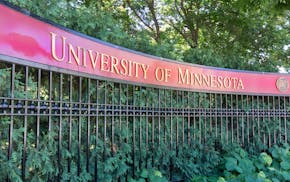Hundreds of Minnesotans are answering a call from state leaders to become certified nursing assistants and help alleviate staffing shortages in long-term care facilities and veterans' homes during the COVID-19 pandemic.
Since Gov. Tim Walz announced in December a goal of recruiting and deploying 1,000 new nursing assistants by the end of January, more than 500 Minnesotans have enrolled in state training programs; 435 are training at schools in the Minnesota State college system and 76 are being trained through HeartCert, a private provider. The state has invested $3.5 million in federal American Rescue Plan funds to pay for these students' tuition, textbooks, uniforms and certification exams.
"We're on our way toward meeting and even exceeding our goal of 1,000 new nursing assistants," Minnesota Higher Education Commissioner Dennis Olson said during a news conference Wednesday. "That's not to say the work is done … If every one of these students obtains a certification and employment, we still have a need for 14,000 additional nursing assistants in the state."
Another private training provider, OnTrack, will soon be able to train up to 100 more people, Olson said. Additionally, there are 319 Minnesota high school students registered for a certified nursing assistant (CNA) course taught in their schools, Olson said, and 129 of them are poised to complete their credential by March.
Nursing assistants are the sixth highest in-demand job in Minnesota and earn a median wage of about $37,300 per year, according to the state Department of Employment and Economic Development.
State leaders say there are not enough students pursuing a CNA credential to meet current demand. Of the more than 11,500 students who enrolled in CNA programs from 2017-2020, just 5,100 completed the credential.
Walz recently activated 400 National Guard members to be trained and deployed as emergency temporary nursing assistants in long-term care facilities, which are facing dire staffing shortages.
Veterans' homes are also dealing with shortages. The five veterans' homes in the state currently employ about 400 certified nursing assistants and have job openings for 85 more, said Douglas Hughes, deputy commissioner of veterans health care for the Minnesota Department of Veterans Affairs.
Maria Pineda de Larsen, a certified nursing assistant at the Minnesota Veterans Home in Minneapolis, said she enjoys helping residents work on their mobility and go about their daily lives. She encouraged Minnesotans to join the ranks of nursing assistants during this critical time.
"I'm very proud to work here," she said.
Hughes touted signing bonuses and hourly pay of $17-22 for nursing assistants at the state's veterans homes and added that CNAs are encouraged to seek more training while they work to increase their earning potential.
"We want you to come in the door as a certified nursing assistant and leave as the director of nursing," Hughes said.
